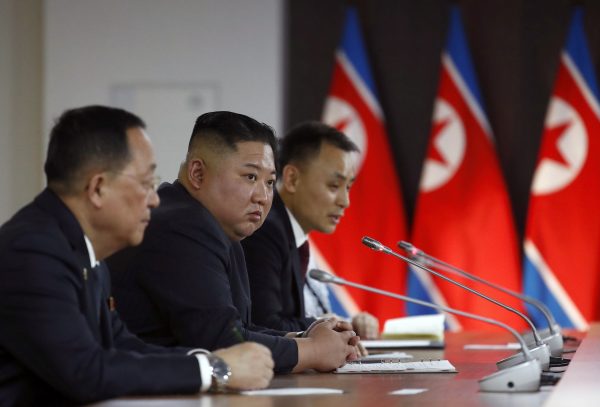The United States expects North Korea to demonstrate a strategic decision to denuclearise before it can receive major economic benefits, while Pyongyang expects Washington to significantly reduce sanctions before (or even without) complete and verified denuclearisation. With negotiations having reached an impasse, the Kim regime is exhibiting greater arrogance in foreign policy, with potentially destabilising consequences.
North Korea is roughly the size of the US state of Mississippi, and its GDP is less than that of a mid-tier American city. Its military is poorly maintained and inadequately trained, in part because of the diversion of resources to nuclear and missile programs. From economic policy to public services — to say nothing of human rights — North Korea is one of the world’s worst governed countries. So for representatives of Pyongyang to belittle US officials, as they have recently, is something of a farce.
North Korea is not led by irrational actors, but the Kim regime relies on a highly distorted view of the past. Ask a North Korean official: who defeated the Japanese in 1945 and who started and who won the Korean War of 1950-1953? You will receive a lesson in fake history that supports the regime’s legitimacy. Such fabrications are not just a matter of national pride or diplomatic posturing if they inform dangerous beliefs about status and military capabilities.
Trump’s two meetings with Kim have provided North Korea propaganda-worthy recognition and raised Pyongyang’s stock in Beijing. But North Korea’s diplomats have difficulty understanding that their country’s weight in US domestic politics is a small fraction of that of the United States in Korean politics. Meanwhile, China’s leaders would prefer to keep Pyongyang ‘in its place’: subservient to Beijing in Asia’s regional hierarchy. The North Korean self-perception causes the regime to believe it can benefit from Chinese largesse, even while defying Beijing’s will.
North Korea’s nuclear and missile programs have often exceeded expectations, but remain a bootleg approximation of a real arsenal. North Korean diplomats have spoken at Track 1.5 meetings since 2017 as if Pyongyang has achieved a mutually-assured destruction relationship with Washington like the Soviet Union did during the Cold War. In Kim’s April 2019 Supreme People’s Assembly speech, he offered criticism of US missile defences against ICBM threats, echoing Russia and China. But those countries actually have credible nuclear deterrents that their leaders do not want eroded by American technological advances. North Korea is exaggerating its nuclear capabilities to increase the status that other governments are willing to afford Pyongyang.
Kim’s recent actions are also an attempt to recover leverage lost to the perception that his regime is desperate for sanctions relief. After largely abstaining from public appearances related to the military since his first meeting with Trump in Singapore in June 2018, Kim has in the last month given strident speeches for military and party officials, observed air force exercises and inspected an alleged precision-guided munitions test. His negotiators, who underestimated American determination ahead of Hanoi, have slandered US officials who refuse to accept merely cosmetic denuclearisation. Kim has also devalued the Moon administration’s efforts for inter-Korean reconciliation and brazenly given himself the title, ‘supreme representative of all the Korean people.’
Kim’s meeting with Russian President Vladimir Putin for a summit in Vladivostok on 25 April 2019 is his latest attempt to raise Pyongyang’s profile while negotiations with the United States and South Korea are not going his way. North Korea’s bargaining strategy tends to seek new concessions by playing its rivals off each other, presenting artificial deadlines, threatening to cancel positive exchanges, raising tensions and repackaging earlier concessions. But Kim also has domestic politics to worry about and wants the Hanoi ‘no-deal summit’ to be understood as a US loss. This is why he approaches both domestic governance and international negotiations from a position of imagined advantage.
However, the North Korean brand of ‘negotiation through strength’ is more arrogance than strategy. While the Trump administration has been clear about greater economic benefits requiring substantive denuclearisation, North Korea continues to seek more for less.
To disabuse Kim of this approach, the United States needs to get past the current stage of trade tensions with China and coordinate tougher enforcement of UN sanctions against North Korea. The US Congress has a role to play on sanctions legislation and implementation and, therefore, wields important leverage.
The Kim regime should meaningfully respond to engagement while it can, because future terms may not be as generous. The window provided by the Trump and Moon administrations is closing, and headwinds for the North Korean economy are building. If the Kim regime’s overconfidence leads it to believe that time is on its side, it is likely to make further miscalculations.
It would be a mistake for North Korea’s leadership to wait out its current counterparts, return to nuclear and missile testing or believe that a top-down approach can substitute for working-level progress on denuclearisation.
Dr Leif-Eric Easley is an Associate Professor in the Division of International Studies at Ewha Womans University, Seoul. His research focuses on trilateral cooperation among South Korea, Japan and the United States on engaging China, Myanmar and North Korea.

